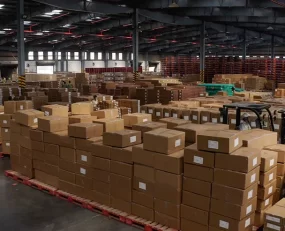
Flexible storage, automation and new recruitment methods. Will UK warehouses keep pace with ecommerce? Kirsty Adams reports.
The word on the UK warehouse property scene is that online retail is set to increase by 7% annually, reaching 28.4% by 2027. That prediction comes from Kevin Mofid, Head of EMEA Logistics Commercial Research at Savills. According to research from Prologis, this growth will likely create a demand for an additional 48 million sq ft of warehouse space over this period.
Because of this boom – plus world events like Brexit and a global pandemic – warehouse operators in the UK are offering more flexible storage options, as well as looking to automation, AI and robotics, to manage the boom as it heads in their direction.
It’s not that operators aren’t used to peaks. Christmas and Black Friday have been throwing curve balls at the people who lead these operations for most of their careers.
At the same time, there is a cost-of-living crisis. Can consumers afford to feed this boom? Well, the wealthier consumers can. IMRG data shows that premium fashion retailers accelerated their growth in 2023, seeing a 5.5% increase in February compared to last year.
Warehousing as a Service (Waas) and on-demand warehousing are models which aim to manage some of the volatility we’re seeing. In the UK, companies like Visku, Warehouse Space and Iron Mountain are offering services which could accommodate the uplift.
Automation will also play its part. According to recent research by McKinsey & Company, warehouse automation may grow by more than 10% per year through 2030.
Although warehouse automation is increasingly becoming a competitive necessity, automating a warehouse is also an expensive exercise – 6 River Systems estimates that it costs roughly between $5-15m to install semi-automated solutions in the average warehouse. However, the emergence of the Robotics-as-a-Service (RaaS) business model is making automation more accessible for the everyday warehouse operator, by reducing the amount of upfront capital expenditure needed to install automated systems in warehouses. As the economy continues its steady recovery, a jump in warehouse automation over the next several years is likely, particularly in those providers that offer the RaaS business model.
Is an ecommerce boom sustainable?
It’s 2024. Warehouses aren’t just preparing for ecommerce. The target – for sustainable operations – is ecommerce fulfilment with green credentials. Wincanton’s recent investment in Invar (a UK-based specialist in warehouse execution software, automation and controls) claims to not just be about rapid fulfilment. They claim that the, “ … acquisition represents a key milestone in Wincanton’s strategic roadmap to create sustainable supply chain value through technology and automation.”
A major challenge in the UK remains around labour. A lot of UK warehouse pickers and packers left in the aftermath of Brexit, and the sector is faced with a critical shortage (there was also a shortage before Brexit.)
One way that the sector is trying to tackle the shortage – as discussed at the UKWA 2024 conference in March – is by creating programmes/working with partners to recruit people for whom barriers to employment are higher, such as those coming from job centres, ex-offenders, people with disabilities or neurodiverse backgrounds and refugees.
The UK Warehousing Association remains frustrated that the UK government won’t add warehouse workers to the UK’s shortage occupation list (SOL), which would open-up visa opportunities to warehouse workers.
The UK warehousing sector prides itself on being agile, and operators are tackling challenges with automation, new recruitment methods and flexible storage. Will it be enough to handle Savills predictions? Let’s hope so.
Author: Kirsty Adams
Source: Ti Insights
Supply chain strategists can use GSCi – Ti’s online data platform – to identify opportunities for growth, support strategic decisions, help them stay abreast of industry trends and development, as well as understand future impacts on the industry.
Visit GSCI subscription to sign up today or contact Michael Clover for a free demonstration: [email protected] | +44 (0) 1666 519907